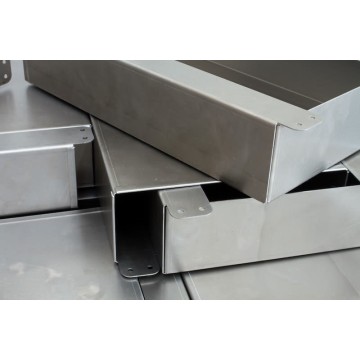
In the automotive field, the choice of sheet metal materials is crucial, which directly affects the performance, safety, appearance and cost of the car. With the continuous progress of science and technology, a variety of different sheet metal materials emerge in an endless stream, providing a rich choice for car manufacturers.
Common types of sheet metal materials:
1. Ordinary carbon steel
Ordinary carbon steel is a more traditional sheet metal material, which has a wide range of applications in the automotive field. It has the advantages of low cost, moderate strength and good processability. In some cost-sensitive automotive parts, such as frames,
Chassis and other parts, ordinary carbon steel is often chosen. However, ordinary carbon steel also has some shortcomings, such as relatively large weight and poor corrosion resistance.
2. High strength steel
The application of high strength steel in automobile field is more and more extensive. Its strength is higher than that of ordinary carbon steel, which can reduce the weight of the car body while ensuring the structural strength of the car, thereby improving the fuel economy of the car. High-strength steel also has good collision energy absorption properties, which can better protect the safety of people in the car in the event of a collision. According to the different strength, high strength steel can be divided into high strength low alloy steel, double phase steel, phase change induced plastic steel and other types.
3. Aluminum alloy
Aluminum alloy is a kind of light metal material, with the advantages of light weight, corrosion resistance, good thermal conductivity and so on. In the automotive field, aluminum alloy is widely used in body coverings, engine blocks and other parts. The use of aluminum alloy can significantly reduce the weight of the vehicle and improve the handling and fuel efficiency of the vehicle. At the same time, the appearance of aluminum alloy has a good texture, which can enhance the grade of the car. However, the cost of aluminum alloy is relatively high, and in some parts with high strength requirements, its performance may not be as good as high-strength steel.
4. Magnesium Alloy
Magnesium alloy is a lighter metal material than aluminum alloy, which has the characteristics of low density, high specific strength and stiffness, and good shock absorption. In the automotive sector, magnesium alloys can be used to manufacture some lightweight components, such as dashboard brackets, seat frames, and so on. However, the corrosion resistance of magnesium alloy is poor, the processing is difficult, the cost is relatively high, and the application in the automobile is still relatively limited.
The comparison of different sheet metal materials
1.Intensity:
The strength of high-strength steel is the highest, followed by ordinary carbon steel, and the strength of aluminum alloy and magnesium alloy is relatively low. In some key structural parts of the car, such as the body frame, chassis, etc., it is necessary to use high-strength sheet metal materials to ensure the safety of the car.
2.Weight:
Magnesium alloy is the lightest, followed by aluminum alloy, and high-strength steel and ordinary carbon steel are relatively heavy. In the automotive sector, lightweight is an important development trend, as lower body weight can improve the fuel economy, handling and acceleration performance of the car.
3. Corrosion resistance:
The corrosion resistance of aluminum alloy and magnesium alloy is better, and the corrosion resistance of high-strength steel and ordinary carbon steel is relatively poor. In the use of automobiles, sheet metal materials need to withstand a variety of harsh environments, such as moisture, salt spray, etc., so corrosion resistance is an important consideration.
4. Cost:
The cost of ordinary carbon steel is the lowest, followed by high-strength steel, and the cost of aluminum alloy and magnesium alloy is relatively high. In automobile manufacturing, cost control is very important, so it is necessary to comprehensively consider the performance and cost of sheet metal materials, and choose the most suitable materials.
Selection guide:
When choosing sheet metal materials in the automotive field, the following factors need to be considered:
1. Performance requirements of the car
If the car needs to pursue high performance, such as high-speed driving, good handling, etc., then you can choose high-strength steel or aluminum alloy and other lightweight, high-strength sheet metal materials.
2. Security requirements
The safety of the car is of Paramount importance, and high-strength steel has advantages in collision energy absorption, which can better protect the safety of the occupants of the car.
3. Appearance requirements
If the car needs to pursue high-end appearance texture, materials such as aluminum alloy and magnesium alloy can provide better appearance.
4. Cost control
Under the premise of meeting performance and safety requirements, cost control needs to be considered. Ordinary carbon steel and high-strength steel are relatively low in cost and can be used in some cost-sensitive parts.

![]() August 30, 2024
August 30, 2024

